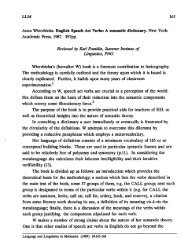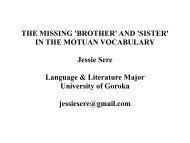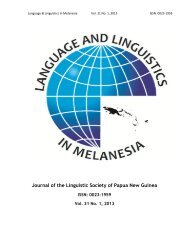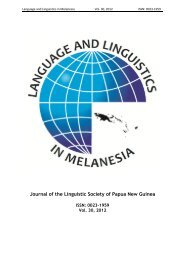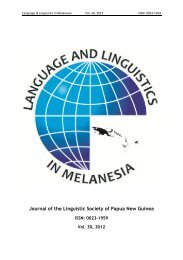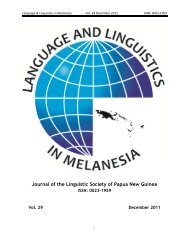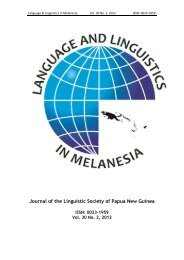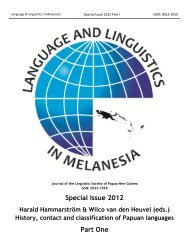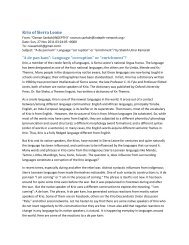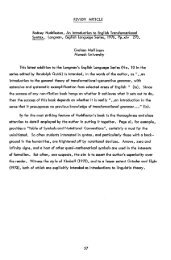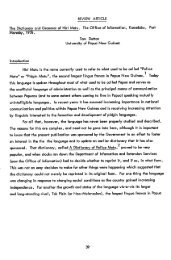Journal of the Linguistic Society of Papua New Guinea
Journal of the Linguistic Society of Papua New Guinea
Journal of the Linguistic Society of Papua New Guinea
You also want an ePaper? Increase the reach of your titles
YUMPU automatically turns print PDFs into web optimized ePapers that Google loves.
Language & <strong>Linguistic</strong>s in Melanesia Vol. 30 No. 2, 2012 ISSN: 0023-1959<br />
Example 7.<br />
Everything that civilized humanity remembers and knows at present, all <strong>the</strong> accumulated experience<br />
in books, monuments and manuscripts – all this colossal expansion <strong>of</strong> <strong>the</strong> human memory, without<br />
which <strong>the</strong>re could be no historical and cultural development, Is due precisely to external human<br />
memorization based on symbols (Vygotsky: 1930).<br />
Which everything<br />
S 1.1 S 2 V 2.1 V 2.2<br />
//Everything that civilized humanity remembers and knows at present,<br />
Which experience<br />
S 1.2<br />
all <strong>the</strong> accumulated experience in books, monuments and manuscripts –<br />
Which expansion<br />
S 1.3 C 3 V 3 S 3<br />
all this colossal expansion <strong>of</strong> human memory, without which <strong>the</strong>re could be no historical & cultural development,<br />
Which expansion<br />
Why<br />
Which memorization<br />
V 1<br />
/ C 1 (ZERO)<br />
/is due precisely to external human memorization based on symbols //<br />
S 1.1 , S 1.2 , S 1.3 V 1 C 1(ZERO)<br />
Adjective clauses<br />
As can be seen from <strong>the</strong> above examples, syntactic analysis becomes easily comprehensible when<br />
grammatical functions <strong>of</strong> words and groups <strong>of</strong> words in <strong>the</strong> sentence are assigned based on <strong>the</strong> logical<br />
relations between <strong>the</strong>m. The logic <strong>of</strong> human thought – generalization – is universal; <strong>the</strong>refore, <strong>the</strong><br />
principles <strong>of</strong> human understanding (associations by resemblance, contiguity, and cause/effect)<br />
determine <strong>the</strong> grammatical functions <strong>of</strong> words and groups <strong>of</strong> words in <strong>the</strong> sentence (that is, <strong>the</strong> ‘parts <strong>of</strong><br />
speech’). Consequently, all human languages have only eight parts <strong>of</strong> speech (word classes).<br />
44



